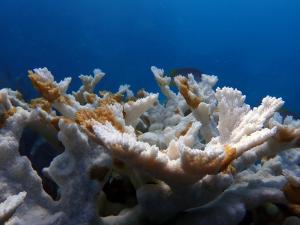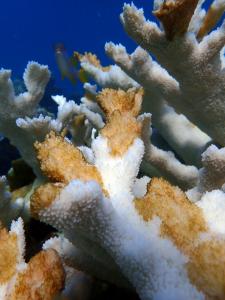
Historic Heatwave Triggering Coral Die-Off in Florida
The coral reefs of Florida, crucial to the local community and the state’s economy, are facing a severe and urgent crisis due to soaring water temperatures.
"On July 20th, CRF™ teams visited Sombrero Reef, a restoration site we've been working at for over a decade. What we found was unimaginable — 100% coral mortality," says Dr. Phanor Montoya-Maya, Restoration Program Manager at Coral Restoration Foundation™, "We have also lost almost all the corals in the Looe Key Nursery in the Lower Keys. Yet, despite the devastation, we remain hopeful and determined. Sites in the Upper Keys, where the water is cooler, are not yet showing such dramatic declines, which gives us time to act. We are now rescuing as many corals as we can from our nurseries and relocating key genotypes to land-based holding systems, safeguarding our broodstock – potentially, the last lifeline left many of these corals."
The situation underscores the urgency of addressing climate change. Mitigating climate change and its potentially devastating effects is a necessity if we are to preserve critical ecosystems like the coral reefs of the Florida Keys.
"Climate change is our present reality," states Dr. R. Scott Winters, CEO of Coral Restoration Foundation™, "The impact on our reefs is undeniable. This crisis must serve as a wake-up call, emphasizing the need for globally concerted efforts to combat climate change."
Even amidst the challenges, hope endures. Coral Restoration Foundation™ is intensifying its efforts to save the coral reefs, adapting strategies to the rapidly evolving situation.
"Never has our restoration work been more crucial," says Jessica Levy, Director of Restoration Strategy at Coral Restoration Foundation™, "Despite this adversity, we will continue work to rescue as many corals as we can. We are part of a coalition of organizations, coordinated by NOAA, working to bank as much genetic diversity as possible. Preserving this diversity is critical to the long-term survival and resilience of our reefs – our hands-on restoration work is now all that stands between these animals and their extinction."
Coral Restoration Foundation™ is calling on everyone to understand the gravity of the situation and lend their support. It is now vital that voters endorse policies and political candidates advocating for climate change solutions and environmentally sustainable practices.
"This is not a partisan issue; everyone will be affected. The climate crisis impacts our way of life and all life on Earth," stresses Dr. Winters. "Our work is more relevant than ever. Hopefully, the dire situation we now face will catalyze broader awareness and stimulate aggressive action to address climate change, triggering greater investment in the restoration and conservation of our planet’s life, including our precious coral reefs."
Alice T Grainger
Coral Restoration Foundation
+1 3054537030
email us here
Visit us on social media:
Facebook
Twitter
LinkedIn
Instagram
EIN Presswire does not exercise editorial control over third-party content provided, uploaded, published, or distributed by users of EIN Presswire. We are a distributor, not a publisher, of 3rd party content. Such content may contain the views, opinions, statements, offers, and other material of the respective users, suppliers, participants, or authors.



